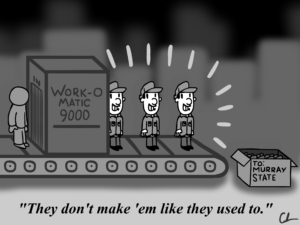When a university outsources a service, it means it is looking to an outside company to take over that service.
For example, Murray State has outsourced dining services, health services and now portions of facilities management. Sodexo, Primary Care and SSC—these are all corporations that have taken over segments of work for the University.
So, what does this mean for Murray State and its students, faculty and staff?
When the University outsourced to Sodexo, the changes were very blunt in that students were very clearly able to see the effects. This is the change that students have likely been the most conscious of as it directly affected their day-to-day habits.
The University’s outsourcing of health services has alternated between two companies: Fast Pace and Primary Care. This change also directly affected students, although not as prominently; health services is no longer free, and students now have to give their insurance (assuming they have health insurance). Now students, many of whom are concerned about paying for gas, groceries, rent and other utility bills, either pay a copay or have to pay in full.
This change prompted Antje Gamble, a professor in the department of art and design, to change her class attendance policy.
“Back when I was a student, I couldn’t have afforded $80 to go see the doctor for a note for class,” Gamble said. “I shifted my attendance policy to one that is more like it is in the real world.”
Gamble’s policy now requires students to email her if they expected to miss class, which is something that employees are required to do at their jobs. She said this gives the students the flexibility to be adults; Gamble said she understands students, too, can get sick, have children of their own get sick or have lives they simply need to take care of.
 This brings us, finally, to the outsourcing of custodial services and grounds work, both services that fall under facilities management. This was a recent decision made by the Board of Regents, finalized just recently after several proposals were pitched to the board in December of last semester. The board heard from several companies, but settled on SSC, a company out of Knoxville, Tennessee.
This brings us, finally, to the outsourcing of custodial services and grounds work, both services that fall under facilities management. This was a recent decision made by the Board of Regents, finalized just recently after several proposals were pitched to the board in December of last semester. The board heard from several companies, but settled on SSC, a company out of Knoxville, Tennessee.
The official changeover to SSC isn’t going to happen until April, but Shannon Thornton, the human resources director for the company, has already laid out what changes the University can expect to see.
Thornton told the board last December that, despite looking to increase staffing levels at the University, current employees will retain their positions. Current staff will see their benefits packages change, however, losing the tuition benefits Murray State has been offering them.
Outsourcing is a beast of very obvious pros and cons. As students, we must understand that the University does everything they do for a reason, and we must believe they have our best interest at heart; at the end of the day, however, a university is a business, and a business needs money to function.
By outsourcing dining services, the University was able to bring in big food chains like Starbucks, Einstein Bros. Bagels and Chick fil A. This in turn draws more students in, ergo drawing in more money. All the while, students are enjoying the mainstream food companies, but vegetarians, pescatarians and vegans (along with others with dietary restrictions) continue to struggle to find dining options on campus.
Outsourcing also affects the relationship between Murray State and the community of Murray. Employees of certain outsourced services lose benefits, and as such, lose their sense of family within the University. This has seeped into other aspects of University life as well.
When outsourcing custodial services and grounds work was pitched to the Board of Regents, current employees of the services spoke against it. Their lives are directly affected by this change, more so than the lives of the students.
While it is hard to offer a solution to the problems that seem to accompany outsourcing, we must not forget to take into consideration the people those problems will affect, and try to weigh the pros and cons accordingly.































































































